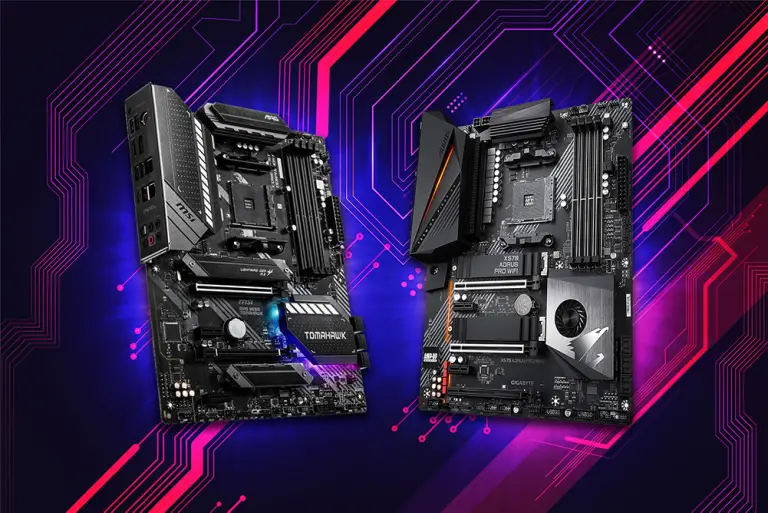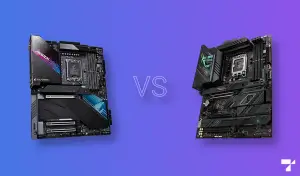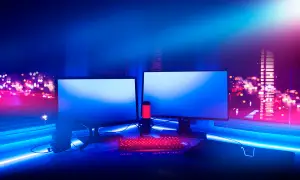AMD’s B550 chipset carries over much of the higher-end X570 features but at a cheaper price making it a viable option if you are in the market for a motherboard to utilize with your Ryzen processor. However, these questions arise, B550 vs. X570: what are the differences? and which should you buy? In this article, we will discuss the significant differences and find out which of these motherboard chipsets is better for you.
B550 vs X570 Motherboard Specs & Comparison
| Chipset | X570 | B550 |
|---|---|---|
| Supported CPUs |
|
|
| Chipset Lane | PCIe 4.0 x4 | PCIe 3.0 x4 |
| PCIe 4.0 lanes | 16 | 0 |
| PCIe 3.0 lanes | 0 | 10 |
| SATA 6.0 Gb/s Ports | 4 | 4 |
| USB 3.2 Gen 2×1 (10Gb/s) Ports | 8 | 2 |
| USB 3.2 Gen 1×1 (5Gb/s) Ports | 0 | 2 |
| USB 2.0 Ports | 4 | 6 |
Differences between B550 and X570 Motherboards:
The differences at a glance:
Chipset PCIe connectivity: PCIe 4.0 is the next generation of connectivity between the motherboard’s different components. Whereas X570 motherboards make use of PCIe 4.0, the B550 motherboard’s use of PCIe 4.0 connectivity is quite limited (more info below). Though, B550’s limited use of PCIe 4.0 is a step up from B450 motherboards which have no PCIe 4.0 connectivity.
Performance and Overclocking: The X570 series of motherboards come equipped with a higher number of Voltage Regulator Modules or VRMs for better and more regulated power delivery to your CPU, allowing for more stable overclocking and better performance when compared to B550 motherboards.
Nvidia SLI and NVLink Support: If you are looking for a dual GPU configuration, you will need a motherboard that supports Nvidia’s SLI or NVLink technology. Most X570 motherboards will support them while only the more premium B550 offerings have the option.
Price: X570 motherboards are the more premium option and offer more features than B550 making them significantly more expensive.
10 Gbps USB and SATA connectivity: The B550 chipset supports much fewer 10 Gbps high-speed USB lanes and SATA ports than the X570, resulting in much fewer USB 3.0 ports when compared to the X570. But this is not really a deal-breaker, as USB 2.0 ports are perfectly fine for your peripherals.
The differences in more detail:
PCIe 4.0 Support
PCIe 4.0 support will enable a maximum bandwidth of 16 GT/s per lane over the 8 GT/s of the older PCIe 3.0, which means that it will require half the number of lanes for running your GPU or SSD. The advantage is that there will be free lanes for extra SSD slots and even Nvidia’s SLI or NVLink certification. The main difference is that the B550 chipset connects to the processor via a four-lane PCIe 3.0 connection while the X570 uses PCIe 4.0. This allows AMD to add 16 PCIe 4.0 lanes to the X570 chipset while the B550 has none.
However, for the B550 chipset, PCIe 4.0 connectivity will run on the CPU directly to the primary PCIex16 and M.2 slots meaning that B550 motherboards will support PCIe 4.0 for up to two devices, unlike B450 motherboards. The manufacturer can use these PCIe 4.0 lanes to provide a variety of features like extra PCIe 4.0 M.2 slots which makes the X570 a more appealing buy but at a higher price.
Connectivity
Continuing from the difference in the number of PCIe 4.0 lanes from the chipset, the X570 allows for more 8 USB (3.0) 10 Gbps ports than the B550, meaning that most ports on your PC can make use of faster data transfer speeds when compared to the two on the B550. Also, an additional eight reconfigurable SATA ports on the X570 are excellent if you are looking for a motherboard with a more significant number of storage options, but keep in mind that this will need to be configured by the manufacturer, so check the amount of SATA ports before purchasing.
VRM Power Phases
The VRMs of your motherboard regulates the amount of power delivered to your CPU by splitting the total energy. The more VRMs, the better since there is more control over the exact power delivered and reduces the load on the individual VRMs, reducing the possibility of failure. X570 motherboards always have a higher number of VRMs than their B550 counterparts, although some premium B550 boards provide more than usual. This allows you to overclock even the more powerful processors like Ryzen 9 while maintaining a stable system allowing you to squeeze out more performance.
Who is the AMD B550 chipset for?
You should buy a B550 motherboard if you are looking for a cheaper X570 alternative with better VRMs than B450 motherboards, PCIe 4.0 support, and future-proofing at a lower price point.
Why you should buy a B550 motherboard:
Cheaper Yet Very Capable X570 Alternative
If you have a budget of about $200 or less for a motherboard, the B550 is most likely the best choice for you. The B550 chipset offers excellent value for your build as it manages to port over most of the features from the X570 at a considerably lower price when compared to more premium X570 boards. So unless you need the extra features and slightly better VRMs of X570, you should choose the B550 instead.
Performance/Overclocking
B550 motherboards will provide the best results when paired with processors like the Ryzen 5 to 7 series and you can overclock them fairly well without running into stability issues. For the top-of-the-line processors like the Ryzen 9 series, which draws more power, it is better to stick with the X570, especially if you plan on overclocking for better stability and performance.
PCIe 4.0 Support
As stated above, B550 motherboards are limited when it comes to PCIe 4.0, but the fact of the matter is that it does support PCIe 4.0, meaning that you will get at least 1 PCIe 4.0 M.2 slot and some USB 3.0 ports for faster connectivity. For example, if you want to utilize a PCIe 4.0 M.2 SDD, a B550 motherboard would be the better choice, rather than a B450 motherboard.
CPUs we recommend using with B550 Motherboards:
- Ryzen 7 5800X
- Ryzen 7 5700X
- Ryzen 5 5600X
- Ryzen 5 5600
- Ryzen 5 5500
- Ryzen 7 3700X
- Ryzen 5 3600XT
- Ryzen 5 3600X
- Ryzen 5 3600
- Ryzen 5 3500X
- Ryzen 5 3500
Who is the AMD X570 chipset for?
You should buy an X570 motherboard if you are looking for a top-of-the-line motherboard to pair with your Ryzen 7 or 9 processor that has better VRMs, extensive PCIe 4.0 support, and other features when compared to the B550 motherboards.
Why you should buy an X570 motherboard:
Higher Core Count CPUs and Overclocking
X570 boards with superior power delivery in the form of a higher number of VRMs will easily be able to overclock even the most power-hungry processors like the Ryzen 9 series with relatively better stability. Also, many X570 motherboards have better quality VRMs and cooling solutions for more reliability and longevity. If you are looking to get a Ryzen 7 or 9 CPU, or are just an enthusiast looking to squeeze out the maximum performance from such processors, we recommend going with the X570 for the best results.
Extensive PCIe 4.0 and USB 3.0 Support and Overall Connectivity:
X570 motherboards have 16 PCIe 4.0 general purpose lanes. With this, motherboard manufacturers can repurpose some of those lanes to provide a host of different features like extra PCIe 4.0 M.2 SSD slots for faster storage.
X570 boards also manage to have a more significant number of high-speed USB 3.0 ports and faster internet options like 10 GiB ethernet. This for example is especially helpful if you need a PC that can hook up to several devices and transfer data quickly or if you want to work off a NAS.
CPUs we recommend using with X570 Motherboards:
- Ryzen 9 5950X
- Ryzen 9 5900X
- Ryzen 7 5800X
- Ryzen 7 5700X
- Ryzen 9 3950X
- Ryzen 9 3900XT
- Ryzen 9 3900X
- Ryzen 7 3800XT
- Ryzen 7 3800X
- Ryzen 7 3700X
Supported Chipsets:
Before you decide to go out and buy these motherboards for your processor, you need to make sure that your processor is supported. Here is a comprehensive list of processors that have support on both systems:

X570 Supports:
- Zen 3 Ryzen Processors
- 3rd Gen Ryzen Processors
- 3rd Gen Ryzen Processors with Integrated Graphics
- 2nd Gen Ryzen Processors
- 2nd Gen Ryzen Processors with Integrated Graphics
- 1st Gen Ryzen Processors (Only AF models)
B550 Supports:
- Zen 3 Ryzen Processors
- 3rd Gen Ryzen Processors
- 3rd Gen Ryzen Processors with Integrated Graphics
Update: Ryzen 5000 Support
Both motherboards will support Ryzen 5000 series processors allowing for reasonable future-proofing, and although the older B450 and X470 will support these chipsets, it will involve a flashing process making them incompatible with previous generation processors. Now that you know the differences between both chipsets and the CPU support for each, head on below to find out what is best for you.
Final Thoughts:
The B550 and X570 are excellent choices for Ryzen CPUs as they provide the right amount of features like PCIe 4.0 and multigenerational CPU compatibility making them good options for your PC build, especially if you are looking to upgrade to Zen 3 processors.
We recommend going with the B550 if you are looking to utilize a Ryzen 7 series processor or lower as it had a decent level of overclocking (depending on the specific B550 motherboard) and is great for use cases such as gaming. You can then use the money saved by going with the B550 instead of an X570 motherboard to upgrade other components of your PC build like the SSD or GPU, which will give you a more significant performance upgrade over the X570.
The X570, on the other hand, is an excellent option for those looking to use the more powerful Ryzen processors such as the Ryzen 9 or Ryzen 7 series and enthusiasts looking to gain maximum performance, especially when overclocking from their PC. If you need extra high-speed ports, additional storage connections, or faster network connectivity, X570 boards have specialized versions to suit your needs without compromising on the performance of other components. The X570 works best with builds where the budget is not a constraint and has proven to be highly reliable.



